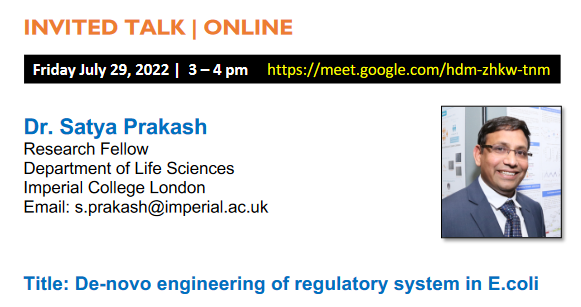School of Biotechnology

Abstract:
A central feature of both artificial and living intelligent systems is the ability to learn decisions that will maximize rewards. The challenge of engineering a living cell able to learn complex algorithms such as playing board games — a classic challenge for artificial intelligence. Here we show a strategy to engineer gene circuits that can adapt their behaviour using reinforcement learning.
We engineered pairs of plasmids that can persistently modify their relative levels of expression according to the history of their own gene regulation. As a proof-of- concept, we used our library to engineer adaptive gene circuits enabling Escherichia coli bacteria to learn — by self-play — the mastering of simplified versions of tic-tac- toe.
Adaptive gene circuits will allow designing (i) generic gene circuits whose behaviour will be ultimately selected unsupervised by evolutionary methods, or (ii) specific circuits with predictable behaviour. Adaptive gene expression with reinforcement learning will allow for encoding complex information processing circuits in living cells, that can be reprogrammed by interacting with the environment.
Additionally, I will also talk about “Using RNA as molecular code for programming cellular function. RNA is involved in a wide range of important molecular processes in the cell such as regulatory, enzymatic, and structural. We propose that RNA can be viewed as a molecular programming language that, together with protein-based execution platforms, can be used to rewrite wide ranging aspects of cellular function.
I will discuss how RNA part repertoires have been combined to build complex genetic circuits and review recent applications of RNA-based parts and circuitry. We shall explore the future potential of RNA engineering and posit that RNA programmability is an important resource for firmly establishing an era of rationally designed synthetic biology.
Brief Profile:
• PhD in Synthetic Biology from School of Life Science (October 2018), university of Warwick, UK. Doctoral work on “De novo engineering of trans-activating riboswitches and directed evolution with using phage” involved the design and construction of various novel RNA switches in E. coli for programmable control of gene activation, or rewiring of cells, as well as sensing molecules (detection of virus).
• Engineered an RNA based synthetic signal transduction cascade in E. coli, consisting of a single RNA molecule (regazyme, an RNA chimera of an aptazyme with a riboregulator) that upon sensing a ligand (theophylline) self-cleaves and releases a riboregulating small RNA.
• Post-doctoral work based on engineering a synthetic genetic system in living cells able to learn, play and master a game: "tic-tac-toe" - based on adaptive memory systems that can predictably adjust their strengths through learning. Engineered E.coli, encoding a library of new genetic switches — that I call memregulons — act as both memory systems and logic gates, and can learn to produce predictable gene
regulation.
• Currently working in Imperial College London as a Research Fellow on metabolic engineering. Developing AI methodology & ML based pathway engineering to increase production of surfactant.
• Guest lecturer in synthetic biology at Coventry University (United Kingdom) since November 2017 to till now.
• Merit pay award by Warwick University School of Life Science for research excellence
• Selected for British Science events (STEM 13th 2017) to present research in the House of common (British parliament)